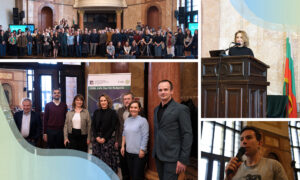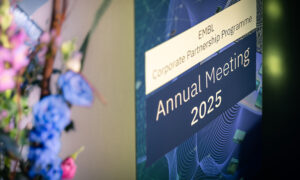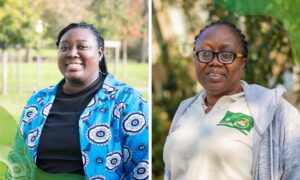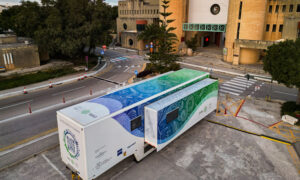
Driving science in Denmark
EMBL alumni convened at the University of Copenhagen on 11 September for the first EMBL alumni meeting hosted in Denmark.
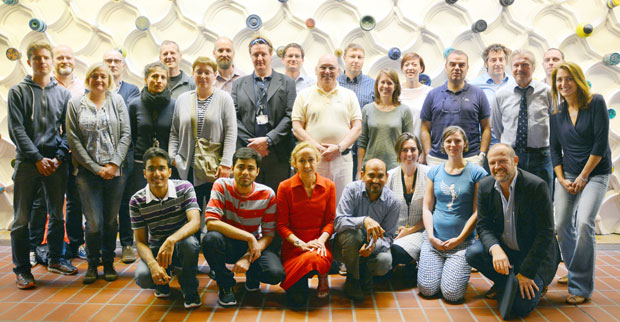
The event, which followed an annual symposium held by the Core Facility for Integrated Microscopy (CFIM) in the Faculty of Health and Medical Sciences, featured an interdisciplinary programme of talks from EMBL staff, alumni, and guests, including Poul Nissen, Head of the DANDRITE – the Danish node of the Nordic EMBL Partnership for Molecular Medicine – and Anne-Marie Engel, Research Director of the Lundbeck Foundation. The event, which also included social and networking aspects, was initiated and organised by alumni Laure Plantard, applications specialist at CFIM, and Jutta Bulkescher, microscopy platform manager at the Novo Nordisk Foundation Center for Protein Research. We catch up with two alumni who spoke at the event.
Science is collaboration
 Rune Linding
Rune Linding
Now: Professor and group leader, Biotech Research & Innovation Center, University of Copenhagen (UCPH)
At EMBL Heidelberg: 2000–2004, PhD Student Gibson Team; 2004, Postdoc, Russell Group
At EMBL… One of the most important things I learned at EMBL, which has remained with me since, is: science is collaboration. Whilst it can be important to gather thoughts alone and focus on individual goals, in the end all groundbreaking life science requires intense and diverse work with other people and groups. At EMBL, one just needs to visit the Heidelberg cafeteria to feel a vibe that is present across the whole lab – the myriad of interactions between labs and people resembles an ants’ nest!
Since then… After leaving EMBL and before returning to Denmark, I trained at Mount Sinai Hospital in Toronto and the Massachusetts Institute of Technology in Boston, and then established my own lab at the Institute of Cancer Research (ICR) in London.
And now… We are currently leading high-level, strategic, multidisciplinary studies of signalling network dynamics driving cancer metastasis in collaboration with other labs at Harvard, Yale, JAX, Memorial Sloan Kettering Cancer Center, MIT, and the University of Copenhagen. This level of collaboration is the EMBL legacy… at least one of them! We are focused on big data network biology, exploring biological systems by developing and deploying algorithms aimed at forecasting cell and tissue behavior. A strategic focus of our lab is the integration of genome-scale quantitative data we generate using mass spectrometry and genomic and phenotypic screens, with the aim to advance network medicine by identifying and targeting signalling networks associated with cancer.
Captivating Copenhagen
 Guillermo Montoya
Guillermo Montoya
Now: Professor, Novo Nordisk Foundation Center for Protein Research (NNF CPR)
At EMBL: 1994–2001, Postdoc, Sinning Group
After EMBL… After leaving EMBL, I started my own lab at the Spanish National Cancer Research Centre (CNIO) in Madrid. There, the major challenge was to set up and start a new centre from scratch. After 6 years, I was promoted to senior group leader in 2007, and following 12 successful years in Spain, I was seduced by an invitation to lead a programme in structural cell biology in a young and dynamic centre at NNF CPR. I was ready for new professional and scientific challenges, and lucky to be supported by my family – there are terrific research possibilities in the city and surrounding area.
Research focus… I am fascinated by the potential of combining different approaches, ranging from biophysics to cellular methods, to understand the gigantic chemical equilibrium that we find in the cell. In my view, many regulatory mechanisms have only so far been dissected in a very ‘lineal’ manner, but it is very clear that these different layers of cellular regulation are interconnected and contain important hubs that may be used to comprehend and target disease. It is therefore crucial to understand these networks from a structural and functional perspective.
Memories… EMBL has been essential for my career: I arrived in Heidelberg as a well-trained biochemist and biophysicist. My thesis – chasing intermediate states of charge separation in photosystem II using femtosecond pulsed laser spectroscopy – enabled me to immerse myself much deeper in molecular, developmental, and cell biology. The integrative nature of EMBL makes it an excellent place for such an immersion, and it is hard to think of somewhere better anywhere in the world! The various seminar programmes were always an invaluable source of new information as well as the many opportunities for discussion over coffee or even at parties; being there was very exciting, a bit like jumping into a pool from a very high platform!
